Whether you’re strolling through the charming streets of Paris or engaging in a business meeting in Montreal, knowing how to greet someone appropriately after noon can make a world of difference in your interactions.
In this article, we’ll explore 75 ways to say “good afternoon” in French, including the term 'bon apres-midi' which is used to wish someone a good afternoon, particularly from around 2 PM onwards, from formal salutations to casual greetings and regional expressions.
When is "good afternoon" used in French?
There are subtle nuances and cultural considerations that can make a significant difference in your interactions.
In English, we commonly use “good afternoon” as a greeting from noon until around 5 or 6 PM.
However, the French equivalent, “bon après-midi,” is used quite differently. French people typically use “bonjour” (hello) as their main greeting throughout the day, regardless of the time.
“Bon après-midi” is more commonly used as a farewell rather than a greeting. It’s the equivalent of saying “have a good afternoon” when parting ways with someone during the afternoon hours.
Additionally, 'bonne soirée' is used to wish someone a good evening, typically from sunset onwards.
Cultural and contextual differences
The French place great importance on greetings, but their approach is somewhat different from English-speaking cultures:
-
Time-based greetings are less common : While English speakers might switch from “good morning” to “good afternoon” at noon, French speakers generally stick with “bonjour” for most of the day. However, 'bonne nuit' is specifically used to bid someone goodnight when they are going to bed.
-
Formality matters : The level of formality in your relationship with the person you’re greeting often dictates your choice of words more than the time of day.
-
Regional variations : Different French-speaking regions may have their own preferred greetings that deviate from the standard “bonjour.”
Scenarios and contexts altering meaning and usage
The use of “bon après-midi” and other afternoon-related phrases can vary based on the situation:
-
Entering a shop : You would say “bonjour” upon entering, regardless of the time.
-
Leaving a business meeting in the afternoon : “Bon après-midi” would be appropriate here as a farewell. Additionally, 'good night' translates to 'bonne nuit' in French and is used when someone is going to bed.
-
Casual settings : With friends, you might use more informal greetings like “salut” at any time of day.
-
Professional emails : “Bonjour” is generally used to open emails, while “Bon après-midi” might be used to close an email sent in the afternoon.
To illustrate these points, consider the following scenarios:
-
You enter a Parisian café at 2 PM. The correct greeting would be “Bonjour,” not “Bon après-midi.”
-
You’re concluding a business meeting at 3 PM. As you leave, you might say, “Merci pour la réunion. Bon après-midi à tous!” (Thank you for the meeting. Have a good afternoon, everyone!)
-
You’re writing an email to a French colleague at 4 PM. You’d start with “Bonjour,” and you could end with “Je vous souhaite un bon après-midi” (I wish you a good afternoon).
-
You’re meeting a French friend for coffee at 3 PM. A simple “Salut!” would suffice as a greeting.
Remember, in France, it’s better to stick with “bonjour” if you’re unsure, as it’s universally accepted throughout the day.
How to say "good afternoon" in French in 75 Ways
The way you say “good afternoon” in French can vary greatly depending on the formality of the situation, your relationship with the person you’re addressing, and even the specific time of day. There are many other French greetings used throughout the day, such as 'bonne fin de journée' and 'bonne soirée'.
Let’s explore both formal and casual ways to greet someone in the afternoon in French.
Formal ways to say "good afternoon" in French
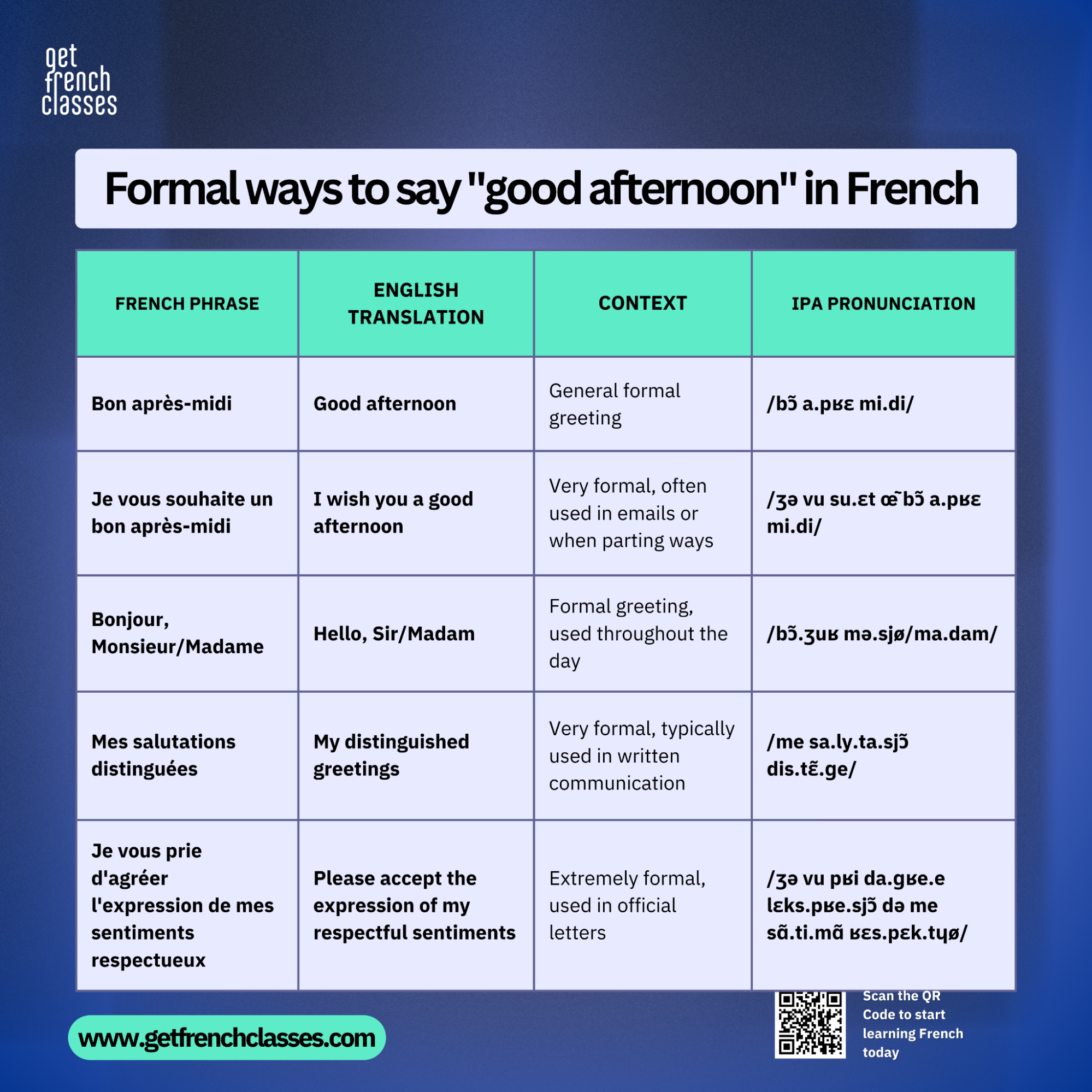
In formal situations, it's important to show respect and maintain a professional demeanor.
Here are some formal ways to say "good afternoon" in French:
| French phrase | English translation | Context | IPA Pronunciation |
|---|---|---|---|
| Bon après-midi | Good afternoon | General formal greeting | /bɔ̃ a.pʁɛ mi.di/ |
| Je vous souhaite un bon après-midi | I wish you a good afternoon | Very formal, often used in emails or when parting ways | /ʒə vu su.ɛt œ̃ bɔ̃ a.pʁɛ mi.di/ |
| Bonjour, Monsieur/Madame | Hello, Sir/Madam | Formal greeting, used throughout the day | /bɔ̃.ʒuʁ mə.sjø/ma.dam/ |
| Mes salutations distinguées | My distinguished greetings | Very formal, typically used in written communication | /me sa.ly.ta.sjɔ̃ dis.tɛ̃.ɡe/ |
| Je vous prie d'agréer l'expression de mes sentiments respectueux | Please accept the expression of my respectful sentiments | Extremely formal, used in official letters | /ʒə vu pʁi da.ɡʁe.e lɛks.pʁe.sjɔ̃ də me sɑ̃.ti.mɑ̃ ʁɛs.pɛk.tɥø/ |
Examples and explanations of nuances:
-
" Bon après-midi " is a straightforward way to say " good afternoon ," but remember that it's more commonly used when parting ways rather than as a greeting.
Example : " Au revoir, bon après-midi! " ( Goodbye, have a good afternoon! )
-
" Je vous souhaite un bon après-midi " is more elaborate and very polite. It's perfect for ending a formal meeting or email.
Example : " Merci pour votre temps. Je vous souhaite un bon après-midi. " ( Thank you for your time. I wish you a good afternoon. )
-
" Bonjour, Monsieur/Madame " is a safe, all-purpose formal greeting that can be used at any time of day, including the afternoon.
Example : When entering a shop at 3 PM, you would say, " Bonjour, Madame " to the shopkeeper.
Casual ways to say "good afternoon" in French
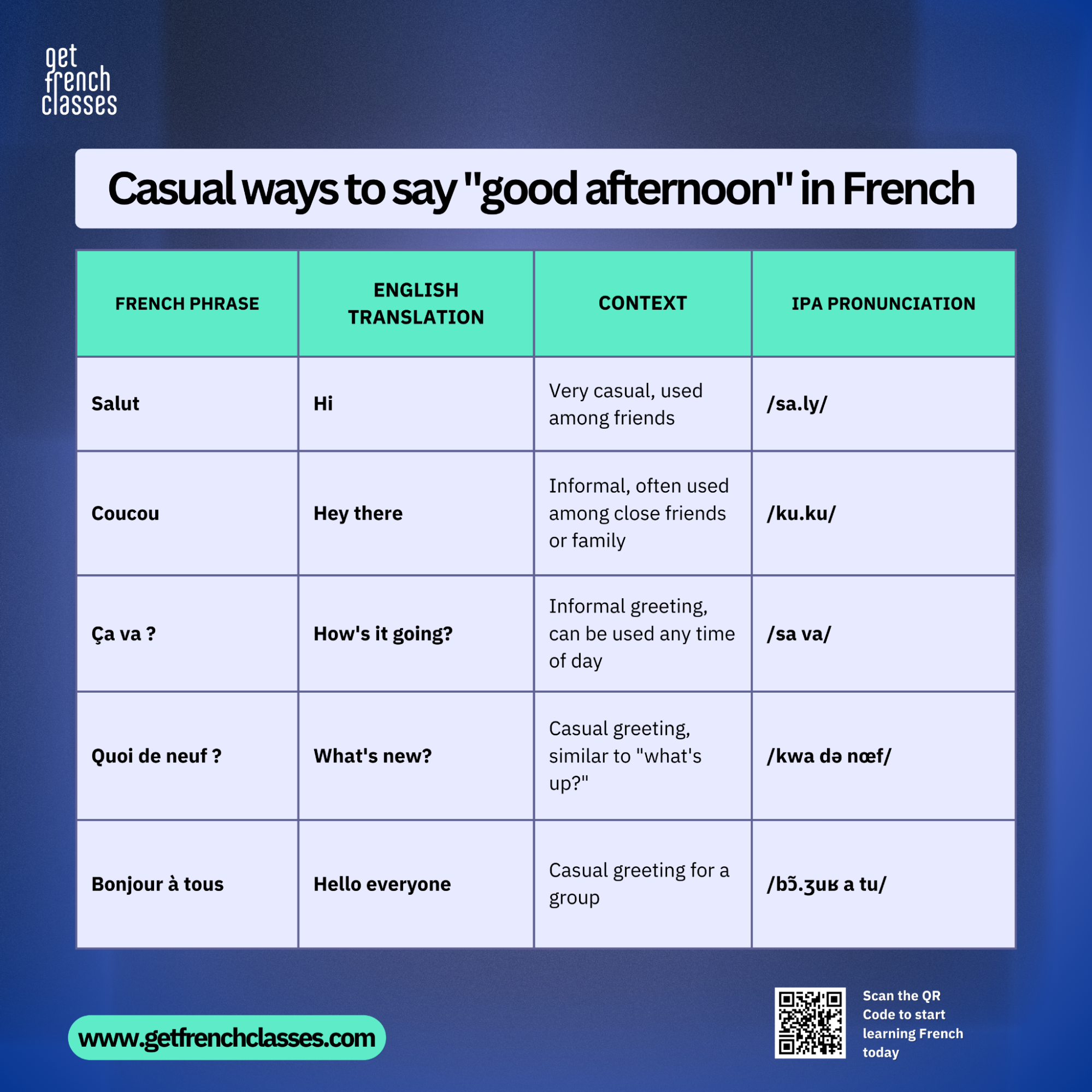
In informal situations with friends, family, or close colleagues, you can use more relaxed greetings. Knowing these casual greetings can help you impress your French friends and enhance social interactions.
Here are some casual ways to say “good afternoon” in French:
| French phrase | English translation | Context | IPA Pronunciation |
|---|---|---|---|
| Salut | Hi | Very casual, used among friends | /sa.ly/ |
| Coucou | Hey there | Informal, often used among close friends or family | /ku.ku/ |
| Ça va ? | How’s it going? | Informal greeting, can be used any time of day | /sa va/ |
| Quoi de neuf ? | What’s new? | Casual greeting, similar to “what’s up?” | /kwa də nœf/ |
| Bonjour à tous | Hello everyone | Casual greeting for a group | /bɔ̃.ʒuʁ a tu/ |
Examples and explanations of nuances:
-
“Salut” is a versatile, informal and general greeting that can be used at any time of day, including the afternoon.
Example : When meeting a friend for coffee at 2 PM, you might say, “ Salut! Ça fait longtemps! “ ( Hi! It’s been a while! )
-
“ Coucou “ is very informal and playful. It’s often used among close friends or family members or when surprising someone.
Example : Arriving at a friend’s house in the afternoon, “ Coucou ! Je suis là ! “ ( Hey there! I’m here! )
-
“ Ça va ? “ is a casual way to greet someone while also asking how they’re doing. It can be used as both a greeting and a response.
Example : 2. Person A : “Salut ! Ça va ?” 3. Person B : “Ça va bien, et toi ?” 4. “ Quoi de neuf ? “ is very casual and is similar to saying “what’s up?” in English. It’s a friendly way to start a conversation with someone you know well.
Example : Running into a colleague at a café in the afternoon, “ Eh, Paul ! Quoi de neuf ? “ ( Hey, Paul! What’s new? )
Regional "good afternoon" greetings in France
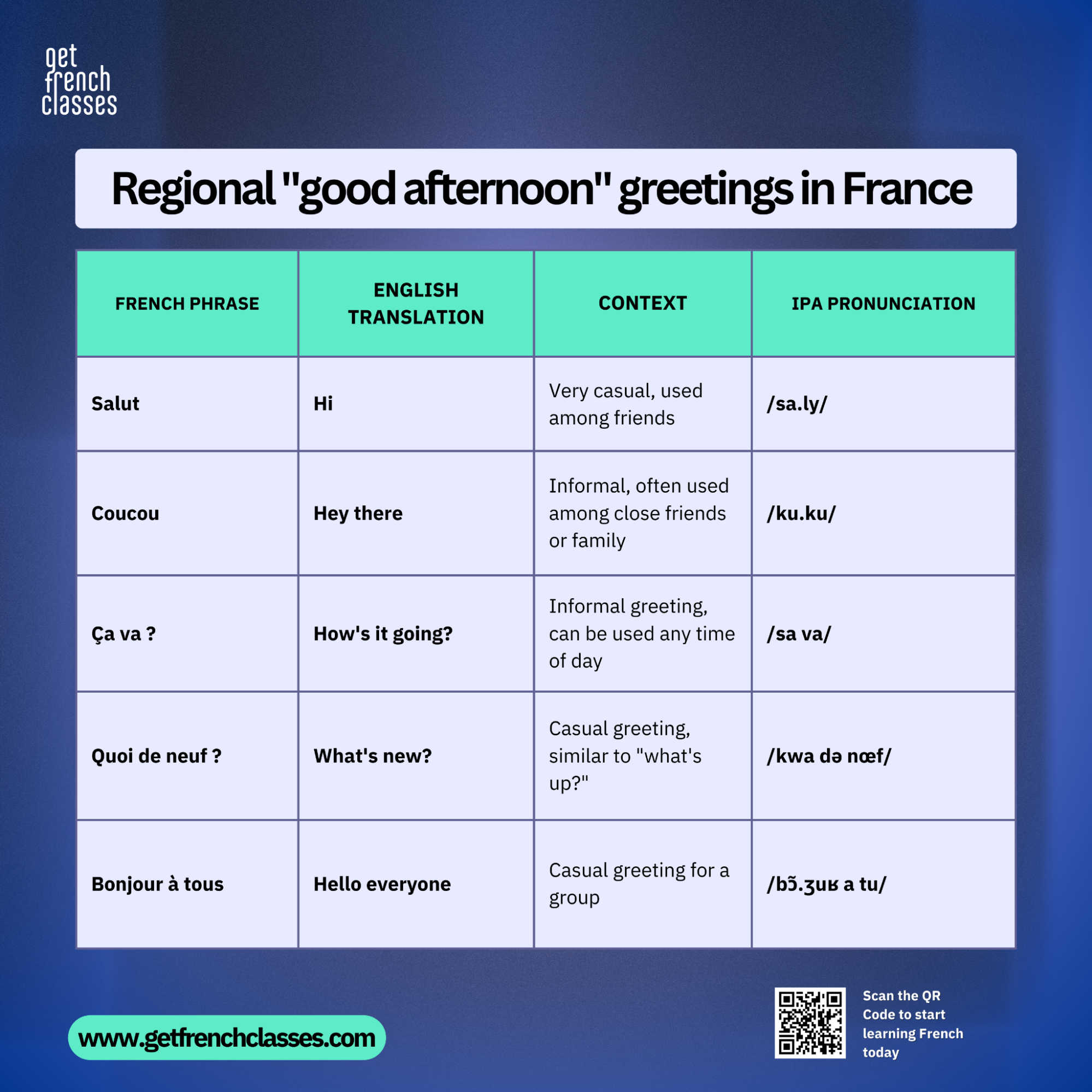
France is known for its diverse regional cultures and dialects. While "Bonjour" is universally understood, you might encounter these regional variations:
| French phrase | English translation | Region | IPA Pronunciation |
|---|---|---|---|
| Bon aprèm | Good afternoon | Colloquial, used throughout France | /bɔ̃ a.pʁɛm/ |
| Adieusias | Hello/Goodbye | Occitanie (Southern France) | /a.djø.sjas/ |
| Kenavo | Goodbye | Brittany | /ke.na.vo/ |
| A tu | Hello | Corsica | /a ty/ |
| Wesh | Hey | Urban areas, particularly among youth | /wɛʃ/ |
Examples and explanations of regional differences:
-
"Bon aprèm" is a shortened, colloquial version of "Bon après-midi" used throughout France, especially among younger people.
Example : " Bon aprèm ! On se voit plus tard ? " ( Good afternoon! See you later? )
-
" Adieusias " is used in the Occitan-speaking regions of Southern France. It can mean both hello and goodbye, similar to "Aloha" in Hawaiian.
Example : In Toulouse, you might hear, " Adieusias ! Comment ça va ? " ( Hello! How are you? )
-
"Kenavo" is a Breton word used primarily as a goodbye, but it's worth knowing if you're in Brittany.
Example : Leaving a café in Rennes, " Kenavo ! À la prochaine ! " ( Goodbye! Until next time! )
Good Afternoon in French Speaking Countries
In French-speaking countries, “good afternoon” is a common greeting used to acknowledge someone during the afternoon hours. The phrase “bon après-midi” is widely used in France, Belgium, Switzerland, and Canada. However, it’s worth noting that the usage of “bon après-midi” may vary depending on the region and cultural context.
For example, in Quebec, you might hear “bon midi” around noon, while in France, “bon après-midi” is more commonly used as a farewell rather than a greeting. In Belgium and Switzerland, the phrase is understood and used similarly to France, but regional dialects and local customs can influence its usage. Understanding these nuances can help you navigate social interactions more smoothly when speaking French in different regions.
Time-specific afternoon greetings in French
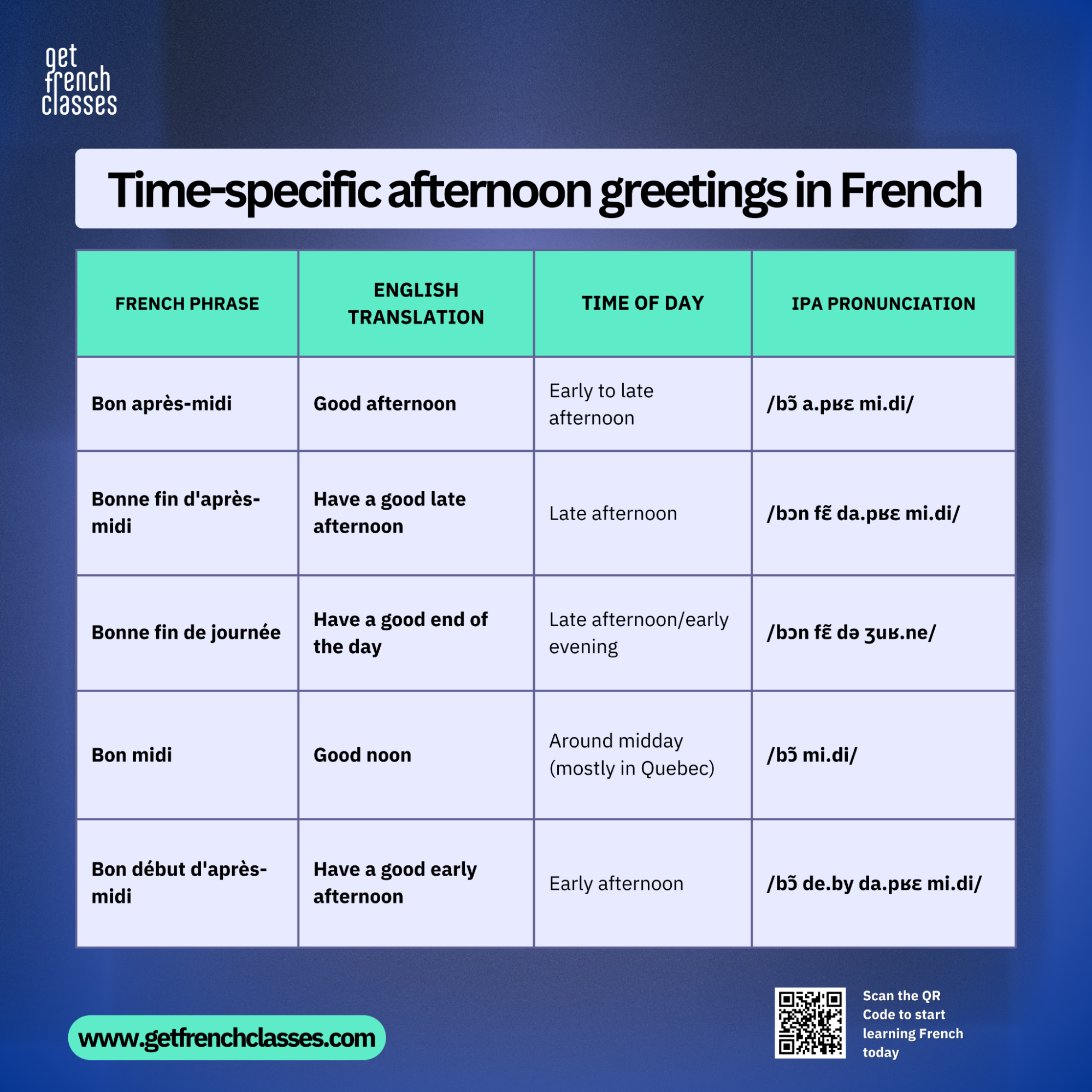
While the French don't typically change their greetings as much throughout the day as English speakers do, there are some time-specific phrases you might hear or use in the afternoon:
| French phrase | English translation | Time of day | IPA Pronunciation |
|---|---|---|---|
| Bon après-midi | Good afternoon | Early to late afternoon | /bɔ̃ a.pʁɛ mi.di/ |
| Bonne fin d'après-midi | Have a good late afternoon | Late afternoon | /bɔn fɛ̃ da.pʁɛ mi.di/ |
| Bonne fin de journée | Have a good end of the day | Late afternoon/early evening | /bɔn fɛ̃ də ʒuʁ.ne/ |
| Bon midi | Good noon | Around midday (mostly in Quebec) | /bɔ̃ mi.di/ |
| Bon début d'après-midi | Have a good early afternoon | Early afternoon | /bɔ̃ de.by da.pʁɛ mi.di/ |
Examples of how greetings change throughout the afternoon:
-
At 12:30 PM (in Québec) : " Bon midi ! Vous allez manger quelque chose ? " ( Good noon! Are you going to eat something? )
-
At 1:30 PM: " Bon début d'après-midi ! Le café est prêt si vous en voulez. " ( Have a good early afternoon! The coffee is ready if you want some. )
-
At 3:00 PM: " Bon après-midi ! J'espère que votre réunion s'est bien passée. " ( Good afternoon! I hope your meeting went well. )
-
At 5:00 PM: " Bonne fin d'après-midi ! N'oubliez pas notre rendez-vous de demain. " ( Have a good late afternoon! Don't forget our appointment tomorrow. )
-
At 6:30 PM: " Bonne fin de journée ! Rentrez bien chez vous. " ( Have a good end of the day! Have a safe trip home. )
How to respond to "good afternoon" in French
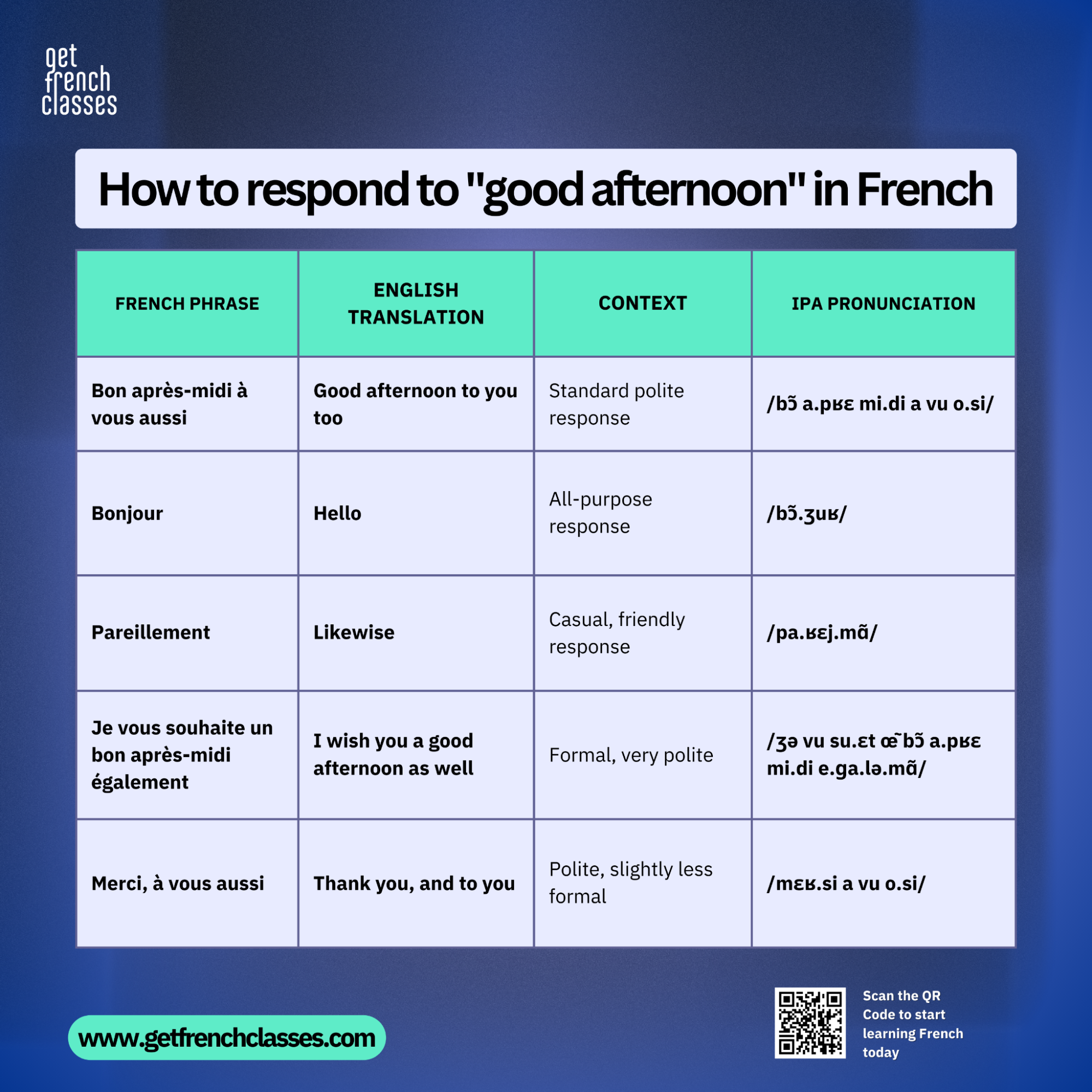
Knowing how to respond to greetings is just as important as knowing how to initiate them. In French, responses often mirror the initial greeting, but there are various ways to add warmth or formality to your reply. Here's a table of common responses:
| French phrase | English translation | Context | IPA Pronunciation |
|---|---|---|---|
| Bon après-midi à vous aussi | Good afternoon to you too | Standard polite response | /bɔ̃ a.pʁɛ mi.di a vu o.si/ |
| Bonjour | Hello | All-purpose response | /bɔ̃.ʒuʁ/ |
| Pareillement | Likewise | Casual, friendly response | /pa.ʁɛj.mɑ̃/ |
| Je vous souhaite un bon après-midi également | I wish you a good afternoon as well | Formal, very polite | /ʒə vu su.ɛt œ̃ bɔ̃ a.pʁɛ mi.di e.ɡa.lə.mɑ̃/ |
| Merci, à vous aussi | Thank you, and to you | Polite, slightly less formal | /mɛʁ.si a vu o.si/ |
Examples of appropriate responses:
-
Basic exchange:
-
Person A: "Bon après-midi !"
-
Person B: "Bon après-midi à vous aussi !" ( Good afternoon! - Good afternoon to you too! )
-
All-purpose response:
-
Person A: " Bon après-midi, comment allez-vous ? "
-
Person B: " Bonjour ! Je vais bien, merci. " ( Good afternoon, how are you? - Hello! I'm well, thank you. )
-
Casual, friendly response:
-
Person A: " Passe un bon après-midi ! "
-
Person B: " Pareillement, merci ! " ( Have a good afternoon! - Likewise, thanks! )
-
Formal, very polite response:
-
Person A: " Je vous souhaite un bon après-midi, Monsieur. "
-
Person B: " Je vous souhaite un bon après-midi également, Madame. Merci beaucoup. " ( I wish you a good afternoon, Sir. - I wish you a good afternoon as well, Madam. Thank you very much. )
-
Polite, slightly less formal:
-
Person A: " Bon après-midi et bonne continuation ! "
-
Person B: " Merci, à vous aussi ! Bonne journée. " ( Good afternoon and have a good rest of your day! - Thank you, and to you! Have a good day. )
Remember, in French culture, it's important to respond to greetings. Failing to do so can be seen as rude. Even a simple "Bonjour" in response to any greeting is better than not responding at all.
Also, note that the French often combine their response with an inquiry about the other person's well-being.
For example:
-
Person A: " Bon après-midi ! "
-
Person B: " Bon après-midi à vous aussi ! Comment allez-vous ? " ( Good afternoon! - Good afternoon to you too! How are you? )
This not only responds to the greeting but also helps to initiate a more extended conversation if appropriate.
Common mistakes to avoid when saying "good afternoon" in French
While learning to say "good afternoon" in French, there are several common mistakes that non-native speakers often make. Being aware of these can help you communicate more effectively and avoid potential social faux pas.
Timing errors
-
Using "Bon après-midi" as a greeting:
-
Mistake: Saying "Bon après-midi" when entering a shop at 2 PM.
-
Correction: Use "Bonjour" instead. "Bon après-midi" is more commonly used when parting ways.
-
Switching to "Bonsoir" too early:
-
Mistake: Saying "Bonsoir" (good evening) at 5 PM.
-
Correction: Continue using "Bonjour" until around 6 PM or when it starts getting dark.
-
Using time-specific greetings unnecessarily:
-
Mistake: Changing from "Bonjour" to "Bon après-midi" at exactly 12:00 PM.
-
Correction: In France, it's perfectly acceptable to use "Bonjour" throughout the entire day.
Formality mismatches
-
Being too casual in formal situations:
-
Mistake: Saying "Salut" (hi) to your boss or a client in the afternoon.
-
Correction: Stick with "Bonjour Monsieur/Madame" in professional or formal contexts.
-
Being overly formal with friends:
-
Mistake: Saying "Je vous souhaite un bon après-midi" to close friends.
-
Correction: A simple "À plus tard" (see you later) or "Bonne journée" (have a good day) would suffice.
-
Forgetting to use honorifics:
-
Mistake: Saying just "Bonjour" to an elderly person or someone in a position of authority.
-
Correction: Use "Bonjour Monsieur/Madame" to show respect.
Pronunciation Pitfalls
-
Mispronouncing "après-midi":
-
Mistake: Pronouncing it as "a-pray mee-dee" /a.pʁe mi.di/
-
Correction: The correct pronunciation is /a.pʁɛ mi.di/. Pay attention to the "è" sound in "après".
-
Silent 's' in "après":
-
Mistake: Pronouncing the 's' at the end of "après"
-
Correction: The 's' in "après" is silent. It should sound like "ah-preh".
-
Liaison errors:
-
Mistake: Saying "bon-napré-midi" (making a liaison between "bon" and "après")
-
Correction: There should be no liaison here. Pronounce it as "bohn ah-preh mee-dee".
-
Nasal sound in "bon":
-
Mistake: Pronouncing "bon" as "bohn" with a clear "n" sound
-
Correction: "Bon" has a nasal vowel sound. It should sound more like "boh" with a nasalized "o".
To avoid these mistakes, remember these key points:
-
"Bonjour" is your safest bet throughout the day in most situations.
-
Use "Bon après-midi" more as a farewell than a greeting.
-
Always err on the side of formality unless you're sure a casual greeting is appropriate.
-
Practice the pronunciation, paying special attention to the nasal sounds and silent letters that are common in French.
How to say "good afternoon" in French FAQ
What's the difference between "bon après-midi" and "bonne après-midi"?
The difference lies in the gender of the noun "après-midi":
-
"Bon après-midi" is more commonly used because "après-midi" is generally considered masculine in modern French.
-
"Bonne après-midi" is also correct because historically, "après-midi" could be feminine.
Both forms are acceptable, but "bon après-midi" is more frequent in contemporary usage. The meaning remains the same regardless of which form you use.
Example:
-
"Je vous souhaite un bon après-midi." (I wish you a good afternoon.)
-
"Passez une bonne après-midi." (Have a good afternoon.)
Is it okay to say "bonjour" in the afternoon?
Yes, it's absolutely fine to say "bonjour" in the afternoon. In fact, it's the most common and safest greeting to use throughout the day in French.
-
"Bonjour" literally means "good day" and is appropriate from morning until evening.
-
French speakers don't typically switch to a specific afternoon greeting the way English speakers might switch to "good afternoon."
You can confidently use "bonjour" as your go-to greeting at any time of day, including the afternoon.
How late in the day can you say "bon après-midi"?
You can say "bon après-midi" until early evening, typically around 6 PM or when it starts to get dark. However, keep in mind:
-
"Bon après-midi" is more commonly used as a farewell rather than a greeting.
-
After about 6 PM or at sunset, it's more appropriate to switch to "bonsoir" (good evening).
-
The exact timing can vary depending on the season and specific social context.
Example timeline:
-
12 PM - 6 PM: "Bon après-midi" is appropriate (but "bonjour" is always safe)
-
After 6 PM or at sunset: Start using "bonsoir"
Are there any gestures that accompany afternoon greetings in French culture?
Yes, there are common gestures that often accompany greetings in French culture, including in the afternoon:
-
La bise: A light kiss on each cheek, common among friends and family. The number of kisses varies by region (typically 2-4).
-
Handshake: Common in formal or professional settings. A firm, brief handshake is typical.
-
Wave: A simple hand wave might accompany a verbal greeting, especially in casual settings or when there's some distance between people.
-
Slight nod: Often accompanies a verbal greeting, especially in more formal situations or with strangers.

Remember:
-
Physical greetings like la bise or handshakes are less common since the COVID-19 pandemic. Always follow current social norms and respect personal boundaries.
-
In professional settings, wait for the higher-status or older person to initiate any physical greeting.
-
When in doubt, a simple "bonjour" with a nod or small wave is always a safe choice.
These gestures typically accompany the verbal greeting, whether it's "bonjour," "bon après-midi," or any other form of hello.
How to Use Bon après-midi in Everyday Conversations
“Bon après-midi” is a versatile greeting that can be used in various situations, from formal to informal settings. Here are some examples of how to use “bon après-midi” in everyday conversations:
-
Meeting Someone for the First Time : When you’re introduced to someone in the afternoon, you can say, “Bon après-midi, enchanté(e)” (Good afternoon, nice to meet you). This shows politeness and sets a positive tone for the interaction.
-
Greeting a Friend or Acquaintance : If you’re catching up with a friend or someone you know, you might say, “Bon après-midi, comment allez-vous?” (Good afternoon, how are you?). This is a friendly way to start a conversation and show interest in the other person’s well-being.
-
Saying Goodbye : When parting ways in the afternoon, you can use “Bon après-midi, à plus tard” (Good afternoon, see you later). This is a courteous way to wish someone well for the rest of their day.
It’s also important to note that “bon après-midi” can be used in combination with other greetings, such as “bonjour” or “salut,” to create a more informal or casual tone. For instance, you might say, “Bonjour et bon après-midi!” (Hello and good afternoon!) to add a bit of warmth and friendliness to your greeting.
By understanding how to use “bon après-midi” appropriately, you can enhance your interactions and make a positive impression when speaking French.
